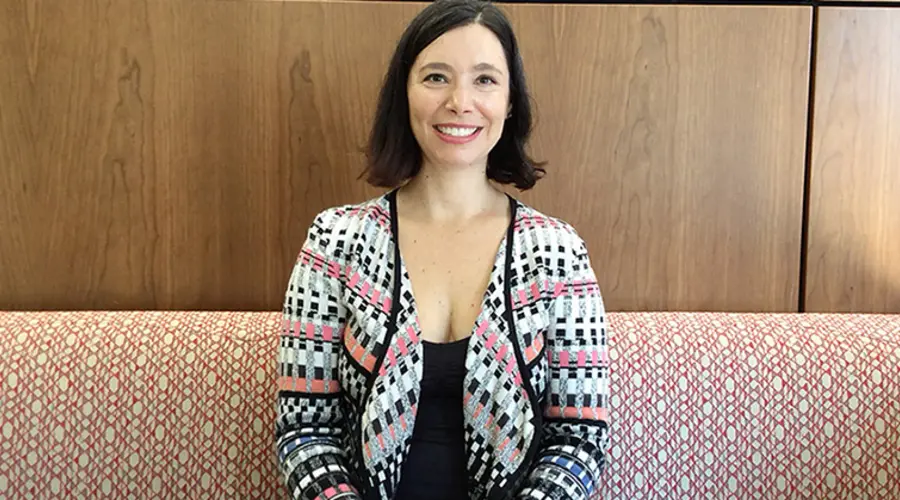
Bitcoin's value may remain uncertain, but whether it is ethical appears more clear to Professor Tobey Scharding.
Is bitcoin an ethical currency? Not according to professor's new research
Tobey Karen Scharding, a visiting professor and fellow at Rutgers Business School’s Institute of Ethical Leadership, has carved out an area of academic research that raises questions about the ethical nature of new financial instruments. Her latest research takes a look at bitcoin, an intriguing cryptocurrency that Scharding describes as having this “odd staying power.”
There are 21 million bitcoins in circulation. In 2017, a single bitcoin was worth nearly $20,000. During the past year, Bitcoin’s value bounced up and down in the fashion of a pogo stick. These days, the value for one bitcoin is about $6,000. In a new paper, which will be published in Business and Society Review early next year, Scharding takes a look at whether bitcoin is an ethical currency.
When did you first become interested in Bitcoin?
“I got interested in finance ethics during the aftermath of the financial crisis which was the same time I was writing my dissertation about an ethical topic in Kantian ethics. Kantian ethics is very good at examining systemic issues about how people should treat each other across wide systems. So I’m writing my dissertation and watching the news about the breakdown of the world economy. I was really interested in what brought about the financial crisis and that led me to look at different novel financial instruments, the mortgage-backed securities and the credit default obligations. I just became interested in, are these financial instruments ethical? Is it ethical to buy a mortgage-backed security? We know the consequences of all of these people buying mortgage-backed securities was catastrophic but just for each person to buy a mortgage-backed security, is that something wrong to do? My first paper in finance ethics was about mortgage-backed securities and that was published in 2015. I take an interest in new financial instruments so when people started talking about cryptocurrencies, I was naturally inclined to be interested in those as well.”
How did you evaluate bitcoin from the perspective of an ethicist?
“My question was, is Bitcoin an ethical currency not is it ethical to use bitcoin or is it ethical to trade some dollars for bitcoin. So, I investigated this problem through an account of ethical currency that was offered by Johann Gottlieb Fichte in the early 1800s. Fichte was a follower of Kant. Kantian ethics are very pure. He wants to know what is the good and the right thing to do. Fichte is much more applied. He takes a more practical approach. One of the things that he did was to discuss the value of currency for a society. I became interested in applying his account to bitcoin both because I happen to be familiar with it through my philosophical research, but I was also interested in using it because bitcoin is so new. It’s murky and there are so many questions about it and so much uncertainty that I felt actually uncomfortable applying some of the other ethical theories that I would regularly turn to. The main resources I have are ethical theories – Kantian ethics, utilitarianism, virtue ethics, these are well-developed theories that will give an evaluation of what is the right thing to do. With bitcoin, I felt there were too many uncertainties. I felt the evaluations they give would not be very strong. I thought that combining the novelty and uncertainties of crypto currencies with this really interesting older account of what makes a currency ethical would be a good way to get started in understanding cryptocurrencies."
What did you find?
“So Fichte in his account of currency, talks about the role that currency plays in an ethical society, the value that currency has in making good lives possible for people within a society. The key insight of his account is that having a stable and secure currency allows people to live their lives, to secure the goods they need to survive, to have a family and to do things they enjoy. The key basis of this is being able to exchange goods with other people through the currency. I thought it was interesting to apply Fichte’s insights about the value of the stability of the currency to bitcoin. It’s not necessarily obvious why bitcoin’s instability is problematic from an ethical point of view. It makes it an interesting investment. It probably makes it undesirable as a currency because you never really know what it’s worth. I thought the insights about how, if the currency is really fluctuating in value such that you could become a pauper or really rich in a matter of a couple of days, you can’t carry out your life. The idea of making a plan for your life is really important in Fichte’s ethics. I was hoping the ultimate evaluation would turn out more ambiguous and the evaluation would turn out some good qualities and some negative qualities because those are the most helpful, especially with novel financial products. But the evaluation was pretty negative because bitcoin didn’t really have any way to secure its value, and so it wouldn’t be able to fulfill the ethical purpose of currency on Fichte’s account of stabilizing and securing these exchanges over generations.”
Is it possible that in time, cryptocurrency may become a more ethical currency?
“If you have a nation that takes over a cryptocurrency then that would definitely give it a way of fulfilling these ethical goals of stability and security. One of the things that is so cool about crypto currency is the value is secured by the community of users. The community of users records the transactions and ensures the value. It’s a radically democratic way of thinking about currency. If that community of users could create stability and security in the value of the currency, then it definitely could fulfill Fichte’s goals for an ethical currency.”
Visiting professor Tobey Scharding
Press: For all media inquiries see our Media Kit



